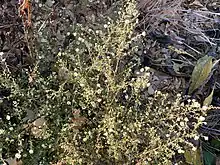| Symphyotrichum parviceps | |
|---|---|
.jpg.webp) | |
 | |
| S. parviceps, St. Charles County, Missouri | |
| Scientific classification | |
| Kingdom: | Plantae |
| Clade: | Tracheophytes |
| Clade: | Angiosperms |
| Clade: | Eudicots |
| Clade: | Asterids |
| Order: | Asterales |
| Family: | Asteraceae |
| Tribe: | Astereae |
| Subtribe: | Symphyotrichinae |
| Genus: | Symphyotrichum |
| Subgenus: | Symphyotrichum subg. Symphyotrichum |
| Section: | Symphyotrichum sect. Symphyotrichum |
| Species: | S. parviceps |
| Binomial name | |
| Symphyotrichum parviceps | |
| Synonyms[2] | |
Symphyotrichum parviceps (formerly Aster parviceps) is a species of flowering plant in the family Asteraceae. It is native to the central United States, and is commonly known as smallhead aster or small white aster. A usually short-lived herbaceous, perennial plant, it may reach 30 to 100 centimeters (1 to 3+1⁄4 feet) in height. Its flowers have white ray florets and pale yellow then purplish disk florets.[3]
Distribution and habitat
S. parviceps is native to Arkansas, Illinois, Iowa, Kansas, Missouri, and Oklahoma in the United States. It is found at elevations between 200 and 400 meters (700 and 1,300 feet) in open, dry areas with sandy and loamy soils.[3] It has been introduced to the Transcaucasus.[2]


Conservation
As of February 2023, NatureServe listed S. parviceps as Apparently Secure (G4) globally and Vulnerable (S3) in Illinois and Missouri. The species' global status was last reviewed on 29 April 1997.[1]
Citations
References
- Brouillet, L.; Semple, J.C.; Allen, G.A.; Chambers, K.L.; Sundberg, S.D. (2006). "Symphyotrichum parviceps". In Flora of North America Editorial Committee (ed.). Flora of North America North of Mexico (FNA). Vol. 20. New York and Oxford: Oxford University Press. Retrieved 12 July 2021 – via eFloras.org, Missouri Botanical Garden, St. Louis, MO & Harvard University Herbaria, Cambridge, MA.
- NatureServe (3 February 2023). "Symphyotrichum parviceps Small-head aster". explorer.natureserve.org. Arlington, Virginia. Retrieved 5 February 2023.
- POWO (2023). "Symphyotrichum parviceps (E.S.Burgess) G.L.Nesom". Plants of the World Online. Royal Botanic Gardens, Kew. Retrieved 5 February 2023.

